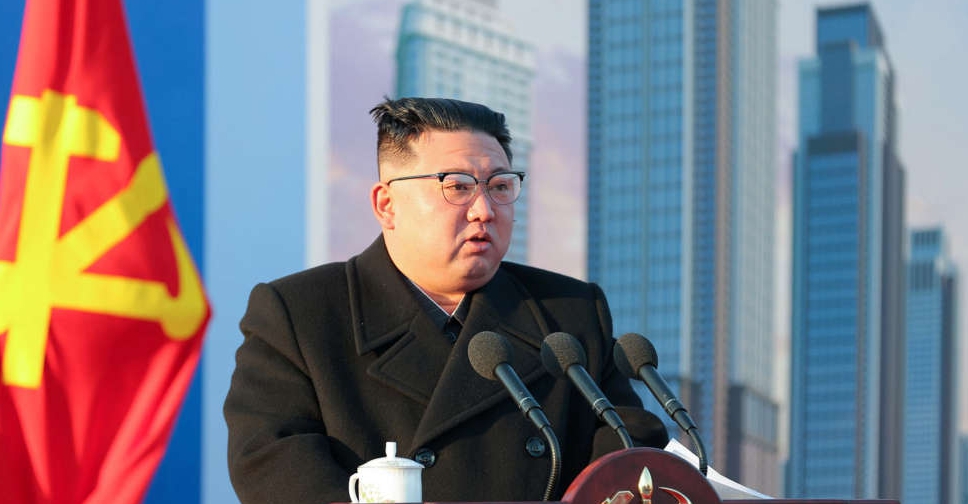
North Korea vowed to launch three new spy satellites, build military drones, and boost its nuclear arsenal in 2024 as leader Kim Jong Un said US policy is making war inevitable, state media reported on Sunday.
Kim lashed out at Washington in lengthy remarks wrapping up five days of ruling party meetings that set economic, military and foreign policy goals for the coming year.
"Because of reckless moves by the enemies to invade us, it is a fait accompli that a war can break out at any time on the Korean peninsula," he said, according to state news agency KCNA.
He ordered the military to prepare to "pacify the entire territory of South Korea," including with nuclear bombs if necessary, in response to any attack.
Kim's speech comes ahead of a year that will see pivotal elections in both South Korea and the United States.
Experts predict North Korea will maintain a campaign of military pressure for leverage around the US presidential elections in November, which could see the return of former President Donald Trump, who traded in both threats and historic diplomacy with Kim.
"Pyongyang might be waiting out the US presidential election to see what its provocations can buy it with the next administration," said Leif-Eric Easley, professor of international studies at Ewha Womans University in Seoul.
The administration of US President Joe Biden says it is open to talks, but it imposed new sanctions as North Korea pushed ahead with more missile tests banned under United Nations' sanctions.
The US also increased drills and deployed more military assets, including nuclear-armed submarines and large aircraft carriers, near the Korean peninsula.
PRESSING FORWARD
Kim said the return of such weapons had completely transformed South Korea into a "forward military base and nuclear arsenal" of the United States.
"If we look closely at the confrontational military actions by the enemy forces...the word 'war' has become a realistic reality and not an abstract concept," Kim said.
Kim said he has no choice but to press forward with his nuclear ambitions and forge deeper relations with other countries that oppose the United States. North Korea has deep ties with both China and Russia.
"North Korea is preparing for further escalation of tension with Washington and Seoul, for at least a year or more, and its hard line policies are likely to be accompanied by efforts for dialogue as well ahead of the U.S. election," Yang Uk, an analyst at the Asan Institute for Policy Studies said.
"Kim is building on his success of the spy satellite to do three more because he knows satellite capabilities are powerful targeting tool for better nuclear command and control."
South Korea holds a parliamentary election in April that could impact the domestic and foreign agenda for conservative President Yoon Suk Yeol, who has maintained a hawkish stance toward Pyongyang.
South Korea's National Intelligence Service (NIS) warned on Thursday that "there is a high possibility that North Korea could unexpectedly conduct military provocations or stage a cyberattack in 2024, when fluid political situations are expected with the elections."
Pyongyang has now ruled out the possibility of unifying with South Korea, and the country must fundamentally change its principle and direction toward South Korea, Kim said.
"North-South relations are no longer a kinship or homogeneous relationship but have completely become a relationship between two hostile countries, two belligerents at war," he said, calling the South a colonised state completely dependent on the United States for national defense and security.
Kim also promised to develop the economy, including the metals, chemicals, power, machinery and railway sectors, while modernising wheat facilities to boost production.
One key policy goal is to invest in science and technological research at schools, he said.
MILITARY TECHNOLOGY
In the past year, North Korea says it successfully launched its first military spy satellite and test fired new solid-fuel intercontinental ballistic missiles (ICBMs), seen as having the range to deliver a nuclear warhead to anywhere in the United States.
A new reactor at North Korea's Yongbyon nuclear complex appears to be operating for the first time, the U.N. nuclear watchdog and independent experts said this month, which would mean an additional potential source of plutonium for nuclear weapons.
North Korea has not tested a nuclear weapon since 2017 but in recent years has taken steps to resume operations at its testing site.
Kim said 2024 would see further military development, including strengthening the nuclear and missile forces, building unmanned drones, expanding the submarine fleet and developing electronic warfare capabilities.




 Israeli attacks on Gaza killed 60 people in 24 hours
Israeli attacks on Gaza killed 60 people in 24 hours
 Trump fires National Security Agency director
Trump fires National Security Agency director
 Israel steps up Syria strikes, says Turkey aims for 'protectorate'
Israel steps up Syria strikes, says Turkey aims for 'protectorate'
 US sending Israel 20,000 assault rifles that Biden delayed
US sending Israel 20,000 assault rifles that Biden delayed



